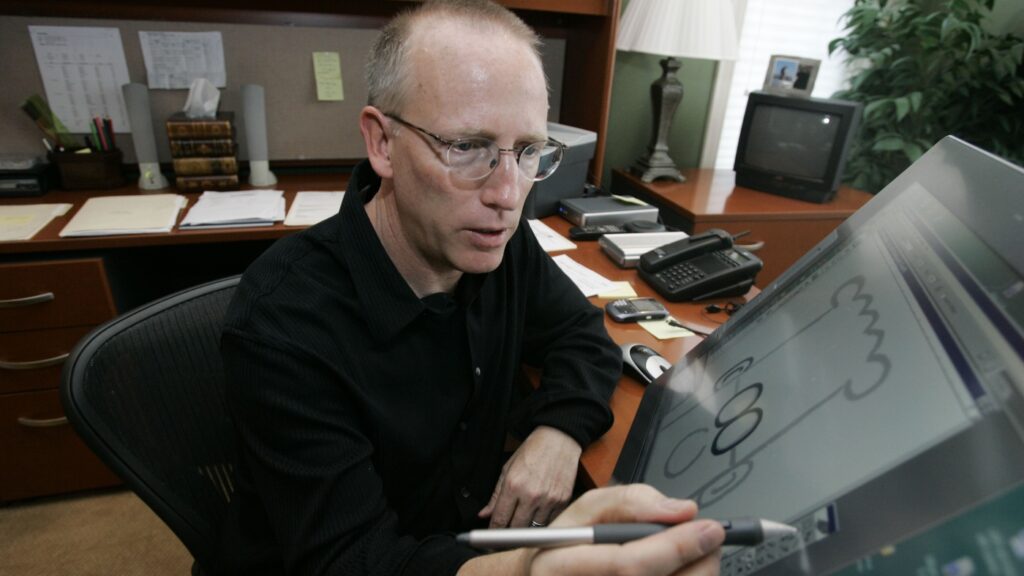
Scott Adams, creator of the office humor comic strip Dilbert, is pictured at work in 2006. Adams has metastatic prostate cancer and appealed to President Trump to help save his life by solving a bureaucratic problem with his health insurance. It worked: his appointment is Tuesday.
Marcio José Sánchez/AP
hide title
toggle title
Marcio José Sánchez/AP
Like many, many Americans, Scott Adams had health insurance problems.
But Adams, who became famous first for his long-running Dilbert cartoon and then for a racist YouTube rant, counts some powerful people in his social media circle: President Trump, his son Donald Trump Jr. and Health and Human Services Secretary Robert F. Kennedy Jr.
Adams then posted his complaint on Adams wrote that he was going to ask Trump to help save his life, adding, “I’m quickly declining. I’ll ask President Trump if he can get Kaiser of Northern California to respond and schedule it for Monday.”

Donald Trump Jr. responded first to the post on X, saying, “I’m going to make sure my dad sees this.”
Shortly after 11 a.m. Sunday, Kennedy responded by saying, “Scott. How can I contact you? The president wants to help.”
Later that day, President Trump posted a screenshot of Adams’ original post and responded “Bring it on!” on your favorite social media platform, Truth Social.
And on Monday, Adams posted that he had an appointment to receive the infusion he needed of the cancer drug, Pluvicto, on Tuesday.
“For context, I waited months for the medication, like everyone else,” Adams wrote. “But I think my files got lost or something and that problem just got fixed. I’m not sure.”

The American health care system is notoriously complex, confusing and expensive, and many Americans have had frustrating experiences similar to Adams’s. However, few have the reach on social networks to have such powerful hands.
“Our health system should not be one where we need the president or the secretary of HHS to intervene on behalf of a high-profile political supporter,” said Anthony Wright, executive director of Families USA, a health care advocacy organization.
Wright added that he is pleased that Adams received the help he needed and said it should be available to everyone. “I’m glad the president is offering to work on cases,” Wright said, noting that federal workers who solve similar problems have been laid off and navigators who help people sign up for Affordable Care Act health insurance have been cut by 90%. Wright also denounced the “”current shutdown on the issue of tax credits that help millions access and pay for health care.”

NPR reached out to Kaiser for comment and emailed him this statement: “Mr. Adams’ oncology team is working closely with him on the next steps in his cancer care, which are already underway. Since it was approved by the FDA three years ago, Kaiser Permanente’s nuclear medicine and medical oncology experts have treated more than 150 patients with Lu-177 PSMA (Pluvicto) in Northern California alone. We know this drug and this disease.”
Adams’ experience generated a chorus of well-wishers online, as well as those who decried the preferential treatment he apparently received.
“There are Americans all over the United States who are currently going through similar circumstances,” wrote one X poster, responding to Kennedy’s offer to help Adams.
Another responded: “How about promoting UNIVERSAL HEALTH CARE, like the rest of the first world industrialized nations, so that EVERYONE can get treatment, not just celebrities and the rich?”
In the fight over the health care shutdown that began Oct. 1, about 24 million Americans who buy their insurance on the ACA marketplaces will see their premiums skyrocket (the average plan will double in price) if Congress doesn’t act. Democrats say they will not reopen the government unless tax subsidies that reduce costs are renewed. Republicans say they will not discuss renewing subsidies until the government reopens.


